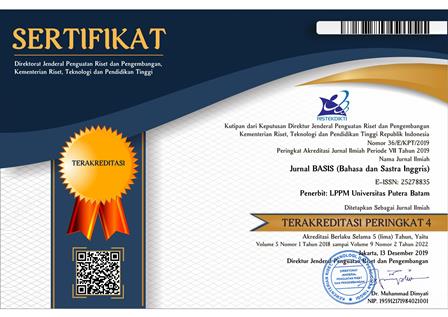MANGO TREE’S DESIRE IN THE STORY OF DENGAR KELUHAN POHON MANGGA: STUDY ON PSYCHOANALYSIS OF LACAN
DOI:
https://doi.org/10.33884/basisupb.v7i2.2480Keywords:
Dengar keluhan pohon mangga, lacan, maria amin, psychoanalysisAbstract
Dengar Keluhan Pohon Mangga (DKPM) is the story written by Maria Amin during the Japanese colonial era. The author uses the metaphor of "mango tree" to escape Japanese censorship to be published so that there are many hidden meanings in this short story. This study aimed to determine the author's unconscious condition through the language used by using Lacan's psychoanalytic theory. This study used a qualitative research method with a poststructuralism approach using Lacan's psychoanalysis. The data source of this research is a document, namely the short story DKPM by Maria Amin. The sampling technique used purposive sampling. In this study, the data were obtained through document analysis, and then the data were analyzed according to Lacan's psychoanalytic theory, which begins by describing the life of the author - in this case, is Maria Amin - to understand his work. After that, he explained the characters of the characters in the DKPM short stories. Furthermore, the analysis was focused on the short stories' language, which can be seen through the metaphor and metonymy phenomena in this short story. In this way, it will be seen how the author's subconscious is filled with a sense of lack and loss, so that the desire to cover up the deficiency appears. The results showed that the short story DKPM is a short story that reflects the writer's unconscious condition. It can be seen in the short stories he wrote that the Indonesian nation was expressed metaphorically by using the word "mango tree", the Japanese nation as "areca tree", and the Dutch nation as "the man". In this short story, the mango tree (the Indonesian nation) is on lacks condition. So that there is a desire to gain recognition for its existence as a subject.
References
Bracher, M. (2009). Jacques Lacan, Diskursus dan Perubahan Sosial: Pengantar Kritik-Budaya Psikoanalisis. Yogyakarta: Jalasutra.
Fadriah, & Zakrimal. (2017). The Analysis of Heathcliff Character in Wuthering Heights by Emily Bronte: A Sigmund Freud's Theory. Jurnal Basis. http://ejournal.upbatam.ac.id/index.php/basis/article/view/529
Faruk. (2012). Metode Penelitian Sastra: Sebuah Penjelajahan Awal. Yogyakarta: Pustaka Pelajar.
Hiasa, F. (2016). Kerinduan pada yang Real dalam Novel Akar Karya Dee. Jurnal POETIKA. https://doi.org/10.22146/poetika.15650
Hill, P. (2002). Lacan untuk Pemula. Yogyakarta: Kanisius.
Jassin, H. B. (2013). Kesusastraan Indonesia di Masa Jepang. Bandung: PT Dunia Pustaka Jaya.
Manik, R. A. (2016). Hasrat Nano Riantiarno dalam Cermin Cinta: Kajian Psikoanalisis Lacanian. Jurnal POETIKA. https://doi.org/10.22146/poetika.15492
Ratna, N. K. (2011). Teori, Metode, dan Teknik Penelitian Sastra: dari Strukturalisme hingga Postrukturalisme Perspektif Wacana Naratif. Yogyakarta: Pustaka Pelajar.
Rosidi, A. (2013). Ikhtisar Sejarah Sastera Indonesia. Bandung: Pustaka Jaya.
Sarup, M. (2011). Panduan Pengantar untuk Memahami Postrukturalisme & Posmodernisme. Yogyakarta: Jalasutra.
Downloads
Published
Issue
Section
License

















